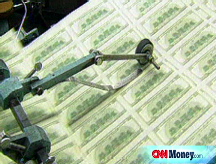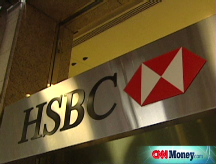Stocks stumble on economic jitters
Trepidation about Tuesday's Fed rate decision has investors playing defense, overshadowing a drop in oil prices.
NEW YORK (CNNMoney.com) -- Stocks closed lower Monday, the third consecutive day of declines, as falling oil prices could not completely overcome concerns about the health of the nation's economy.
Investors also appeared to be showing some restraint ahead of the Federal Reserve's interest rate policy decision and statement on Tuesday.
The central bank, faced with economic weakness and inflation risks, is widely expected to hold rates steady.
In addition to the Fed's statement, Tuesday also brings second-quarter corporate results from Cisco Systems (CSCO, Fortune 500), News Corp. (NWS, Fortune 500) and Procter & Gamble (PG, Fortune 500).
The Dow Jones industrial average (INDU) fell 0.37% and the broader Standard & Poor's 500 (SPX) index lost 0.9%. The tech-heavy Nasdaq composite (COMP) index shed 1.1%.
Bond prices fell, as did gold. The dollar was mixed against other currencies.
While the drop in crude and other commodities helped sentiment, "the bigger picture is what's going to come out of the Fed meeting," said Ryan Larson, senior equity trader at Voyageur Asset Management in Chicago.
The market will be focused on the central bank's statement "to see if the language suggests when a rate hike might take effect," he said.
Stocks slumped Friday, capping a choppy week, after the government said the nation's unemployment rate increased to a four-year high and General Motors (GM, Fortune 500) reported a huge quarterly loss, adding to the already bleak outlook for the auto industry.
Friday's jobs report was an important indication that the economy may be headed for a recession, if it isn't already in one, according to Hugh Johnson, chief market strategist at ThomasLloyd Global Asset Management.
"The employment numbers told us that the economy has been, at best soft, and most likely contracting since October," he said.
"There's really nothing in the numbers today that jolted the markets," Johnson added. "They told us what we already knew: the economy is doing poorly."
Oil: The price of crude fell as traders responded to reports that a tropical storm in the Gulf of Mexico is loosing steam.
Light, sweet crude for September delivery fell $3.69 to settle at $121.41 a barrel on the New York Mercantile Exchange, after being down as low as $119.50.
Crude futures were also being pressured by signs of softening demand, which outweighed concerns about possible supply disruptions due to a tense political situation with Iran.
Stocks often rally when oil prices fall. Many on Wall Street see cheaper crude as the key to bringing gas prices down, which could limit inflation and help speed economic recovery.
Economic news. The Commerce Department reported that personal spending and income edged higher in June. (Full story)
Individual income increased by 0.1% after a revised 1.8% jump in May, matching economists' expectations. The increase was due in part to the government's economic stimulus plan, which included billions of dollars in rebate checks sent to Americans in May and June.
Personal spending increased by 0.6%, topping the 0.5% increase that economists had expected. When adjusted for inflation, however, individual spending actually fell 0.2% following a 0.3% increase in May.
Separately, the government reported that factory orders jumped in June on higher oil prices and demand for military equipment.
The Commerce Department said orders rose 1.7% in June, the best showing since a 1.9% rise in December.
On the labor front, outplacement firm Challenger said the nation's employers announced 26% more planned job cuts in July when compared to June.
Financial firms. One of Europe's largest banks, HSBC Holdings (HBC), reported a sharp decline in quarterly profit due to "difficult financial markets." (Full story)
HSBC's biggest losses were in the North American market, where a subsidiary of the company that was heavily exposed to the subprime mortgage market.
Shares of the British bank fell 1.5%.
The news sent other banks with ties to the subprime market lower, including Wachovia (WB, Fortune 500) and Washington Mutual (WM, Fortune 500).
Other markets. In Asia, stocks finished mostly lower. European markets were mixed in afternoon trading.
Bond prices mostly fell. The benchmark 10-note shed 3/32 to 99 13/32, its yield held steady at 3.94%, unchanged from Friday.
The 30-year long bond fell 8/32 to 96 22/32, yielding 4.58%. The 2-year note, which is most sensitive to changes in interest rate policy, shed 1/32 to 100 14/32, with a yield of 2.51%.
Gold for December delivery fell $9.60 at $907.90 an ounce in New York.
The dollar was mixed against other currencies. The euro rose to buy $1.5589, up from $1.5541 on Friday. But the dollar gained against the Japanese yen, climbing to ¥108.19 from ¥107.75 last week. ![]()







